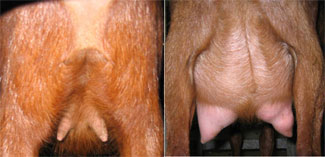Virgin goat's milk

The mammary gland grows rapidly during pregnancy under the effect of elevated concentrations of estrogen and progesterone. Consequently, the mammary gland is prepared for suckling the neonate. The induction of mammary growth (induced lactation) in non-pregnant or virgin animals is possible through the injection of estrogen and progesterone.
Compared to what occurs during pregnancy, mammary growth during induced lactation by hormones is considered insufficient and varies widely between animals. Consequently, induced lactation has variable success rate (58 to 80%) and milk yield (50 to 106% of natural lactation). Researchers tried to improve the consistency of response of induced lactation by the inclusion of other hormones, such as corticoids, placental lactogen, growth hormone, or prostaglandin, in the induction protocol.
In the current study we tried to improve the response to induced lactation in dairy goats by the use of reserpine (a prolactin releasing agent). Prolactin is necessary for the start of milk secretion and lactation in dairy animals. Lactation was induced in virgin Murciano-Granadina goats by the traditional protocol (Estrogen + Progesterone) or an improved protocol (Estrogen + Progesterone + Reserpine).
Udders grew rapidly and secretions accumulated after the hormonal treatments. All goats were milked at day 21 after the starting of the treatment. Reserpine-treated goats produced 25% more milk than control goats, but milk yield was only 55% of primiparous goats after kidding. Milk composition was normal from d 3 of induced lactation onwards, and did not vary between goats treated with the traditional or improved protocol. Goats were mated on d 120, but only 21% of the goats became pregnant, which indicates a negative effect of the hormonal treatment on fertility.
Results show that lactation induction was effective in virgin dairy goats and was improved by reserpine. However, induced lactation was unpractical because of low milk yield and reduced fertility.
References
Salama, AAK; Caja, G; Albanell, E; Carne, S; Casals, R; Such, X. "Mammogenesis and induced lactation with or without reserpine in nulliparous dairy goats",JOURNAL OF DAIRY SCIENCE, 90 (8): 3751-3757 AUG 2007

